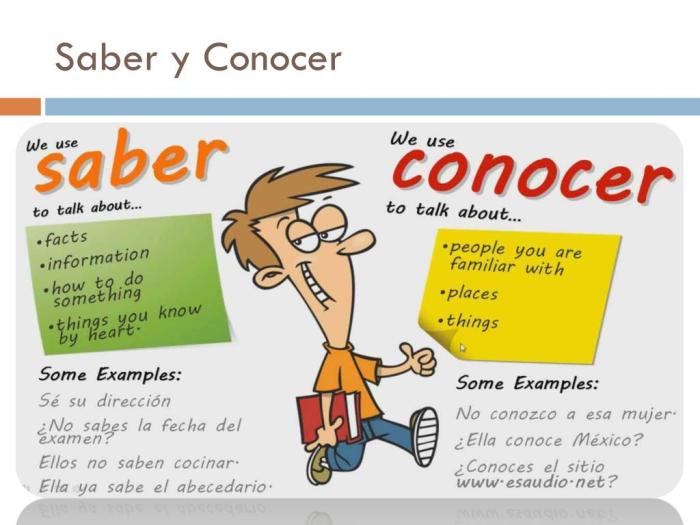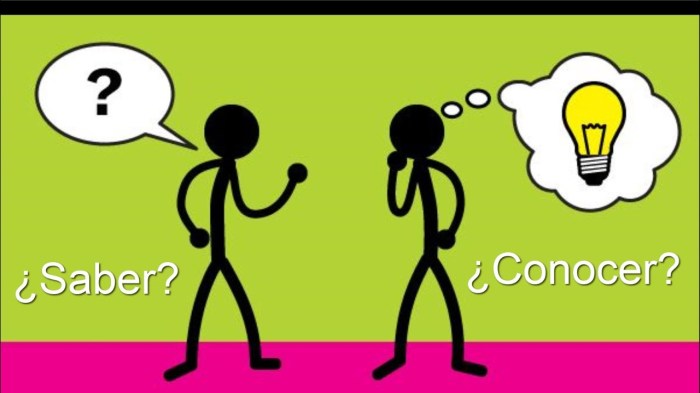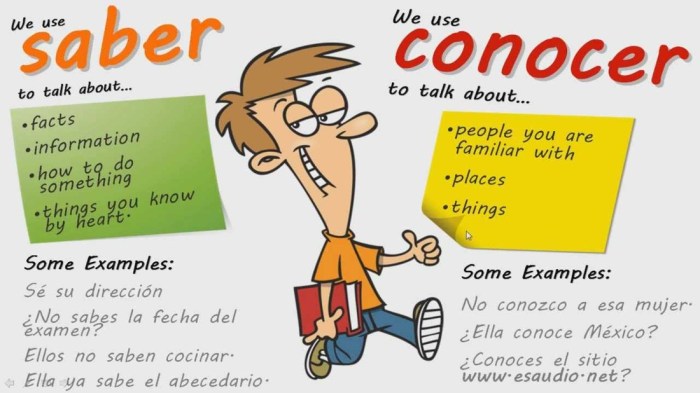Embark on a linguistic journey with “Saber o conocer leccion 6,” where we unravel the intricacies of two essential Spanish verbs. From their distinct definitions to their nuances in usage, this guide will illuminate the path to mastering saber and conocer.
Throughout this exploration, we’ll delve into their conjugations, common expressions, and cultural variations, empowering you with the knowledge to navigate the complexities of Spanish communication.
Saber vs. Conocer

In Spanish, there are two verbs that can be translated as “to know”: saberand conocer. While they both share a similar meaning, they have different nuances and are used in different situations.
Saber o conocer leccion 6 is a useful resource for learning Spanish. If you’re looking for a great place to practice your Spanish, consider visiting best china lake wylie sc . This website offers a variety of resources for learning Spanish, including grammar lessons, vocabulary lists, and conversation practice.
You can also find information about Spanish culture and history on this website. Saber o conocer leccion 6 is a great way to improve your Spanish skills, so be sure to check it out!
Usage of Saber
Saberis used to express knowledge or information that is acquired through study, experience, or observation. It is often used to refer to facts, skills, or abilities.
- Sé hablar español.(I know how to speak Spanish.)
- ¿Sabes la capital de Francia?(Do you know the capital of France?)
- No sé tocar el piano.(I don’t know how to play the piano.)
Usage of Conocer
Conoceris used to express familiarity with a person, place, or thing. It is often used to refer to people we have met or places we have visited.
- Conozco a María desde hace años.(I have known Maria for years.)
- ¿Conoces París?(Do you know Paris?)
- No conozco ese libro.(I don’t know that book.)
Conjugations of Saber and Conocer
To effectively use saber and conocer, it’s essential to understand their conjugations across various tenses. Here’s a comprehensive table outlining the conjugations for both verbs in the present, past, and future tenses:
Present Tense
| Person | Saber | Conocer |
|---|---|---|
| Yo | Sé | Conozco |
| Tú | Sabes | Conoces |
| Él/Ella/Usted | Sabe | Conoce |
| Nosotros/Nosotras | Sabemos | Conocemos |
| Vosotros/Vosotras | Sabéis | Conocéis |
| Ellos/Ellas/Ustedes | Saben | Conocen |
Past Tense, Saber o conocer leccion 6
| Person | Saber | Conocer |
|---|---|---|
| Yo | Supe | Conocí |
| Tú | Supiste | Conociste |
| Él/Ella/Usted | Supo | Conoció |
| Nosotros/Nosotras | Supimos | Conocimos |
| Vosotros/Vosotras | Supisteis | Conocisteis |
| Ellos/Ellas/Ustedes | Supieron | Conocieron |
Future Tense
| Person | Saber | Conocer |
|---|---|---|
| Yo | Sabré | Conoceré |
| Tú | Sabrás | Conocerás |
| Él/Ella/Usted | Sabrá | Conocerá |
| Nosotros/Nosotras | Sabremos | Conoceremos |
| Vosotros/Vosotras | Sabréis | Conoceréis |
| Ellos/Ellas/Ustedes | Sabrán | Conocerán |
Note:Irregular conjugations are highlighted in bold.
Common Expressions with Saber and Conocer: Saber O Conocer Leccion 6

Saber and conocer are two very important verbs in Spanish, and they are used in a wide variety of expressions. Here is a list of some of the most common expressions with saber and conocer, along with their translations and explanations:
Saber
- Saber algo: to know something
- Saber hacer algo: to know how to do something
- Saber de algo: to know about something
- Saber dónde está algo: to know where something is
- Saber cuándo algo va a suceder: to know when something is going to happen
- Saber quién es alguien: to know who someone is
- Saber qué hacer: to know what to do
- Saber cómo hacerlo: to know how to do it
Conocer
- Conocer a alguien: to know someone
- Conocer un lugar: to know a place
- Conocer algo: to be familiar with something
- Conocer bien a alguien: to know someone well
- Conocer de algo: to be knowledgeable about something
- Conocer el camino: to know the way
- Conocer la respuesta: to know the answer
- Conocer el secreto: to know the secret
Saber vs. Conocer in Context

Contextual Usage
To illustrate the differences between saber and conocer in context, consider the following dialogue:
Person A: ¿Sabes dónde está la biblioteca? (Do you know where the library is?) -*Person B: Sí, la conozco. Está en la calle principal. (Yes, I know it. It’s on Main Street.)
In this exchange, “saber” is used to inquire about knowledge of a location, while “conocer” is used to indicate familiarity with a specific place.
Another example:
Person A: ¿Conoces a María? (Do you know Maria?) -*Person B: No, no la conozco. (No, I don’t know her.)
Here, “conocer” is used to express familiarity with a person, implying a personal connection or acquaintance.
Cultural Differences in Saber and Conocer

The usage of saberand conocercan vary across different cultures, leading to potential misunderstandings in communication.
Hispanic Cultures
In many Hispanic cultures, saberis often used to indicate knowledge gained through formal education or study, while conocerimplies a more personal or experiential understanding.
English-Speaking Cultures
In English-speaking cultures, the distinction between saberand conoceris less pronounced. Both verbs can be used interchangeably to express knowledge or familiarity.
These cultural differences can impact communication when speakers from different backgrounds interact. For example, a Hispanic speaker using saberto indicate academic knowledge may be perceived as being overly formal or pedantic by an English speaker.
Activities and Exercises
To enhance your proficiency in using saber and conocer, we’ve devised an interactive activity and a set of exercises to test your comprehension of these concepts.
Interactive Activity
Scenario Matching:Engage in a game where you match scenarios with the appropriate verb (saber or conocer). This activity immerses you in real-world situations, fostering a practical understanding of verb usage.
Exercises
Multiple Choice:Test your ability to choose the correct verb form in various contexts. Select the option that best completes each sentence, solidifying your understanding of saber and conocer.
Fill-in-the-Blank:Reinforce your knowledge by completing sentences with the appropriate verb form. Fill in the blanks with either saber or conocer, honing your ability to apply these verbs accurately.
Short Answer:Demonstrate your grasp of the concepts by answering questions that require you to explain the usage of saber and conocer. Provide concise and clear responses, showcasing your understanding of the nuances between these verbs.
FAQ Explained
What is the key difference between saber and conocer?
Saber refers to knowledge acquired through study or experience, while conocer implies familiarity or acquaintance.
How do I conjugate saber and conocer in the present tense?
Saber: yo sé, tú sabes, él/ella/usted sabe, nosotros sabemos, vosotros sabéis, ellos/ellas/ustedes saben Conocer: yo conozco, tú conoces, él/ella/usted conoce, nosotros conocemos, vosotros conocéis, ellos/ellas/ustedes conocen
Can you provide an example of a common expression using saber?
“Saber estar” means “to know how to behave” or “to have good manners.”